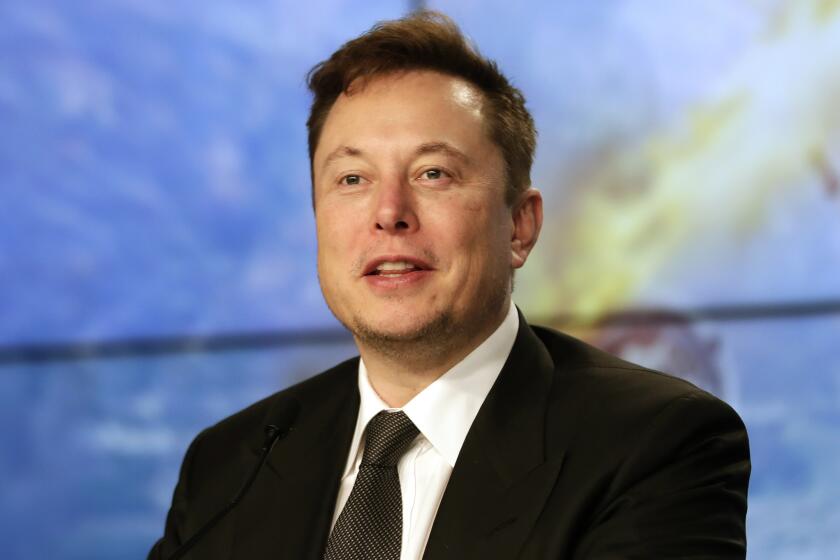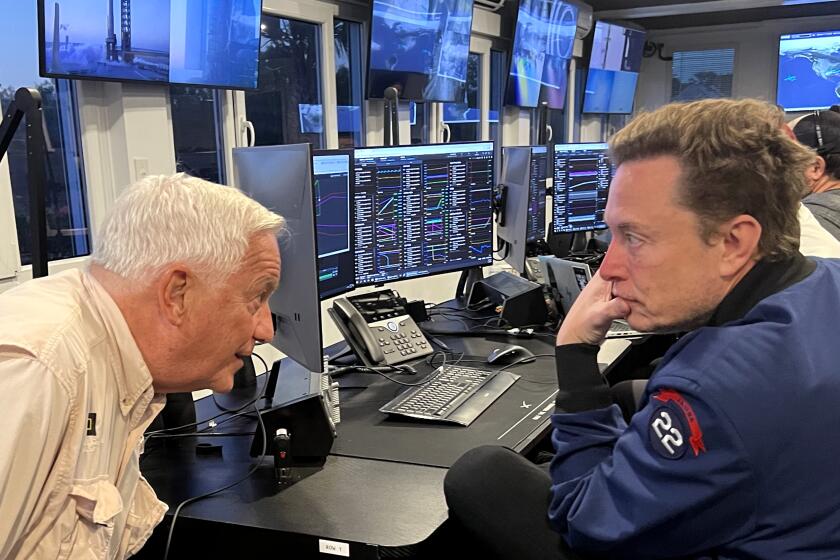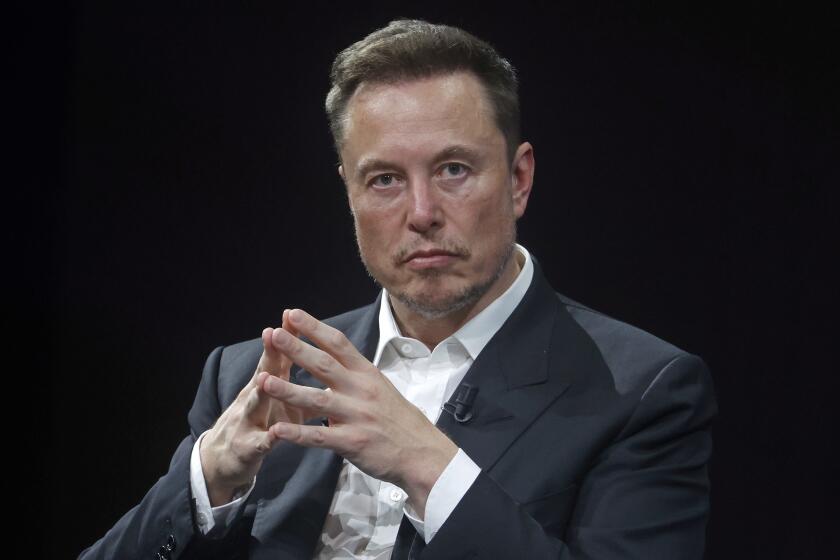‘How Elon Musk Destroyed Twitter’ authors say platform is ‘a tool for controlling political discourse’

- Share via
On the Shelf
Character Limit: How Elon Musk Destroyed Twitter
By Kate Conger and Ryan Mac
Penguin Press: 480 pages, $32
If you buy books linked on our site, The Times may earn a commission from Bookshop.org, whose fees support independent bookstores.
Elon Musk is nearly as inescapable as Donald Trump. The owner of SpaceX and Tesla and the world’s richest man, Musk makes headlines weekly. But these days, it’s more for X, where he stirs up controversy by seemingly amplifying right-wing views and reposting comments suggesting that women should not have the right to vote (only “high status males” and some others should). Musk also recently hosted an interview with Trump that was filled with falsehoods. Last week, Trump proposed a government efficiency commission headed by Musk.
While Walter Isaacson just told Musk’s life story in an authorized biography, a new book zeroes in on Musk and his purchase and ownership of Twitter. “Character Limit: How Elon Musk Destroyed Twitter” — out Tuesday — is written by two California-based New York Times reporters: Kate Conger, who lives in Oakland and has been covering Twitter, and Ryan Mac, who lives in Los Angeles and frequently writes about Musk. When their two subjects converged, they started working together and realized the story warranted a big-picture look beyond what daily articles could provide.
Commentary: Elon Musk bought Twitter just to break it. With a new war, we’re paying the price
Since acquiring Twitter, now X, nearly a year ago, Elon Musk’s changes to the platform have helped perpetuate misinformation, mistrust and hate.
“The Isaacson book is the book that Elon wanted,” Mac said in a recent joint video interview with Conger. “You can tell by the amount that he’s promoted it himself.”
Conger notes that while they didn’t get to interview Musk for the book and found Isaacson’s book helpful for providing Musk’s perspective, “we benefited from reporting around Elon rather than through Elon.”
“You get the clearest portrait of someone from people close to them, not necessarily from themselves,” she said. “All of us have a clouded vision of who we are and how we come across in the world.”
This interview has been edited for length and clarity.
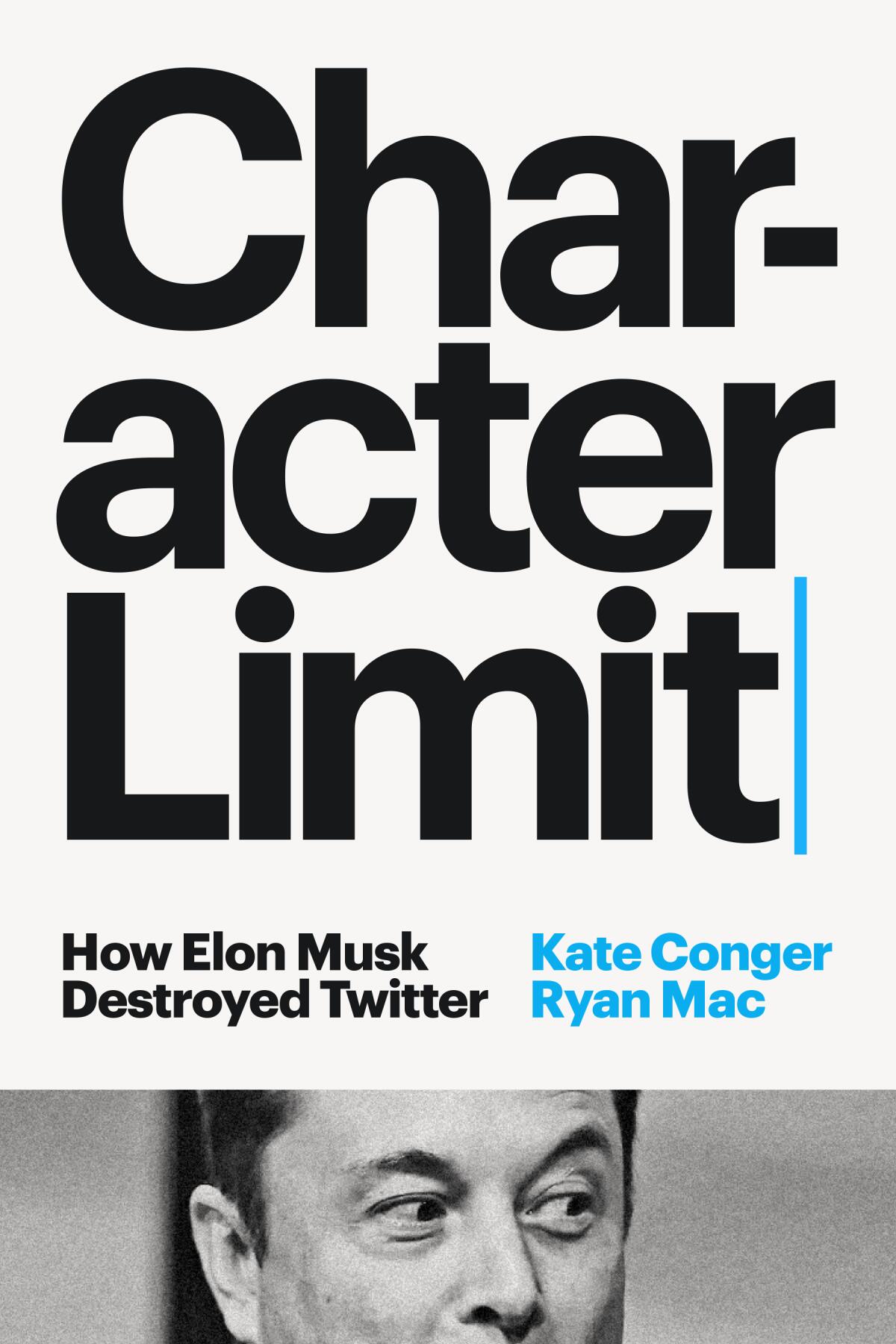
Before Musk, Twitter had serious financial, leadership and content moderation issues. Did Musk destroy Twitter or just remake it in his own increasingly twisted image?
Kate Conger: There was this really simplistic narrative that it was the good guys at Twitter versus the bad guy in Elon and the story is much more complicated than that so we wanted to capture how Twitter came to be in a position where someone could swoop in and acquire it the way Elon did.
Ryan Mac: But on the semantics, Twitter does not exist anymore. It’s X. On financial metrics, the valuation of the company has tanked. Now it’s banned in Brazil. So he has really devalued or destroyed parts of the company down to the name itself.
Why did things go so wrong under Musk?
Mac: He believed he had this expertise in Twitter because he’s an avid social media user. He thought, “I have the most followers, therefore I know what’s best for this company.”
Walter Isaacson’s biography of Elon Musk distilled, from fierce mood swings and Ukraine intervention to his ‘dumb’ Pelosi tweet and that time he had the 405 repainted.
It is inarguable what he’s done as an entrepreneur. SpaceX has revolutionized the space industry. Tesla has mainstreamed electric cars. He didn’t know much about manufacturing electric vehicles. He wasn’t a rocket scientist. But he was able to strip things down to first principles and do things more efficiently.
So he is so convinced that his instinct is right that he acts on any impulse: “I am the hero, therefore I should dictate what happens.” He has been so successful, but in the case of Twitter, that instinct did not serve him well.
Conger: Twitter is fundamentally a social problem not a tech problem while his other businesses focus primarily on engineering issues. He didn’t recognize the character limit he’d reach with the challenges he didn’t know how to deal with.
Mac: There’s not many skills there that match up. Everyone has their own blind spots and in some ways, this book is about Elon’s blind spots, but the issue is that no one can hold him to account.
And he has in some ways radicalized himself. His X feed is littered with misinformation and posts with a Nazi apologist.
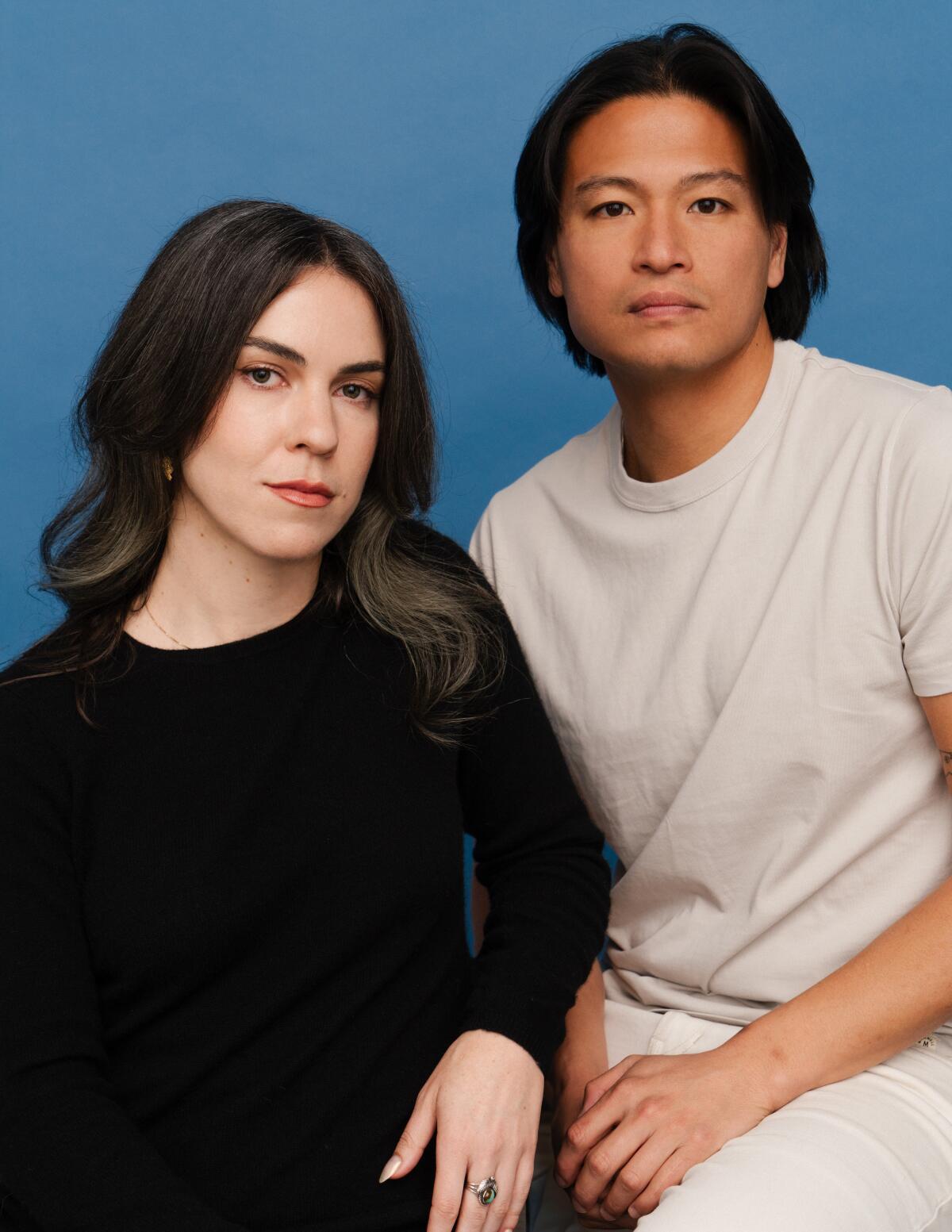
You’d expect more from a “high status male” like himself.
Mac: That’s another post that is not even on the spectrum of reasonable political debate. It’s just bizarre to me.
Were you guys active Twitter users?
Mac: The most addicted.
So, like Elon, you could run the company?
Mac: Oh hell no. It’s like the Defense [Against] the Dark Arts position in “Harry Potter” where people just cycle through. It’s the worst job in the world because you’re just going to get yelled at by some faction all the time. It’s hubristic to think you could do it and I think it takes someone kind of crazy. Hopefully I’m sane enough to reject that position when it’s offered to me.
Walter Isaacson reveals how he shadowed Elon Musk and details billionaire’s brutal treatment of workers, impulsive decisions and chaotic romantic life in a new biography.
When it’s offered? If you were in charge, what would you like to see in terms of content moderation?
Conger: I’m interested in the model [former Twitter Chief Executive] Parag Agrawal was exploring, allowing more types of content without giving them algorithmic amplification and reach. The industry more broadly is starting to drift in that direction and it’s worth exploring.
Ryan, what about you?
Mac: This is the opening of that hubristic belief that I should be able to run a company. I’ll leave that to the professionals.
Conger: First thing Ryan would do is ban my account.
Mac: I would also ban my account so I don’t have to use it anymore.
Do you guys use X less now due to Elon’s changes?
Conger: Yes. It’s mostly a function of the people that I follow migrating to Mastodon, Threads and Bluesky so I chase my interest groups around the internet.
Call it the ‘Isaacson Accord’: the agreement behind Walter Isaacson biographies, including ‘Elon Musk,’ to leave the assumption of difficult genius untouched.
How much impact does X have on politics?
Conger: There is this common perception of tech companies that they are these sort of neutral, faceless entities trying to keep their thumbs off the scale. Twitter’s always tried to maintain this middle ground where it’s a space for political conversation, but the platform has tried to stay in the shadows of that. We’re just here for whatever goes. Elon has very obviously and clearly broken that mold. I hope readers understand more clearly that this was, is and will be a tool for controlling political discourse and to think about it in that way. I really want to dispel the notion that any of these platforms hold a neutral stance.
So should people shift to Threads or other places while Musk owns X?
Conger: I don’t think we want to be ushering a user base from Elon Musk over to Mark Zuckerberg.
Mac: I don’t feel great about using Threads, to be honest. I’ve had my own issues with Zuckerberg.
Conger: Ryan is universally unpopular with CEOs.
Mac: At least Zuckerberg hasn’t banned me, which Musk actually did for a bit.
Conger: Give it time.
Mac: But people are already leaving X. Musk is driving people away. Threads and Bluesky had banner days from Brazilians joining their platforms. That could compound on itself and have a disastrous effect for X.
If X fails completely, will that have any impact on Musk?
Mac: I do think this has damaged his reputation. He is not the all-conquering entrepreneur that can walk into any situation and declare himself the expert. But he’s still the world’s richest man. SpaceX is more dominant than ever. Tesla is now the dominant electric vehicle seller here. So I think 10 years from now, he’ll be more prominent than ever.
More to Read
Sign up for our Book Club newsletter
Get the latest news, events and more from the Los Angeles Times Book Club, and help us get L.A. reading and talking.
You may occasionally receive promotional content from the Los Angeles Times.
